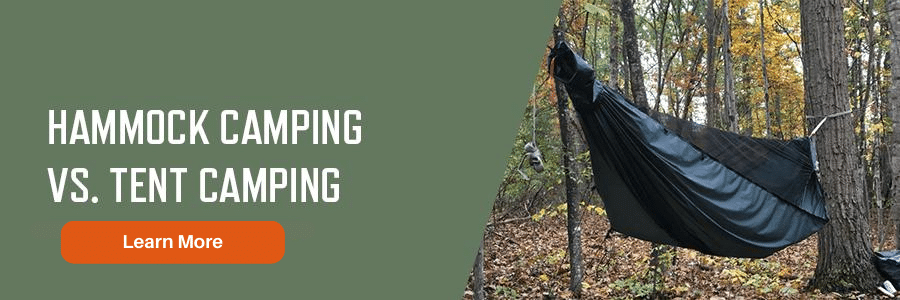July 22, 2019
posted in: Outdoor Health Benefits

6 Benefits of Sleeping in a Hammock
Camping is one of the best ways to truly appreciate the beauty and serenity of the great outdoors. Laying under the stars surrounded by the sounds of nature is the perfect way to fall asleep. As any adventure enthusiast knows, getting a comfortable night’s rest can be difficult without the right backpacking and camping materials.
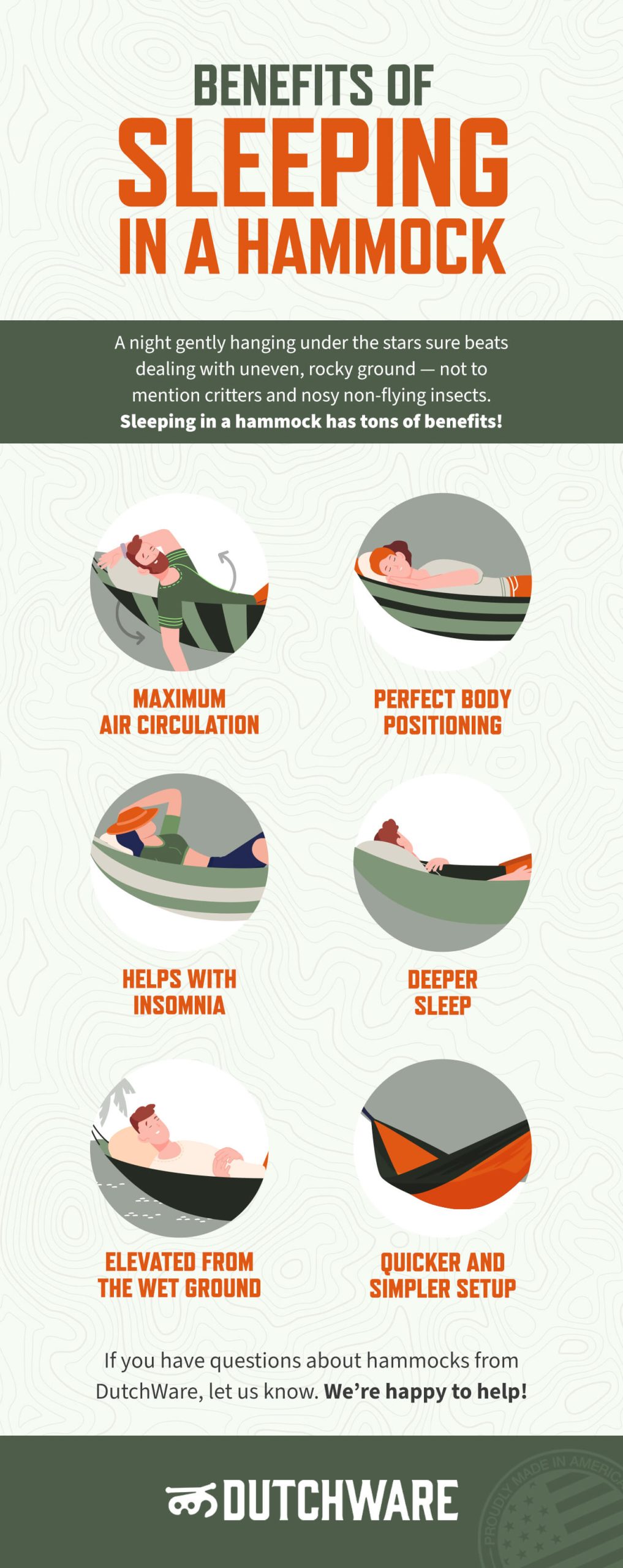
The team at Dutchware knows how important comfort and convenience are during your trip. We’ve even provided tips for sleeping comfortably in a hammock. We believe that all travelers should learn about the benefits of sleeping in a hammock so they can maximize their enjoyment.
There are many reasons to sleep in a hammock — perhaps the most significant is that certain hammock styles provide advantages that deliver a restful experience no matter where your journeys take you.
Table of Contents
Maximum Air Circulation
Although it might not be the first thing that comes to mind, air circulation is highly important when you sleep, especially if you’re camping. Trust us — once you’ve spent a night in a hammock, you’ll never want to sleep in a muggy tent again!
We explore the great outdoors to connect with nature, and it may come as no surprise to learn that simply inhaling the fresh air that our green spaces create is enough to positively impact our well-being.
Fresh air aids our digestive system, improves our cardiovascular health, brightens our mood, strengthens our immune system, cleans our lungs and improves our cognition and energy levels. Lounging and sleeping in a hammock allows you to surround yourself with this fresh air all night long.
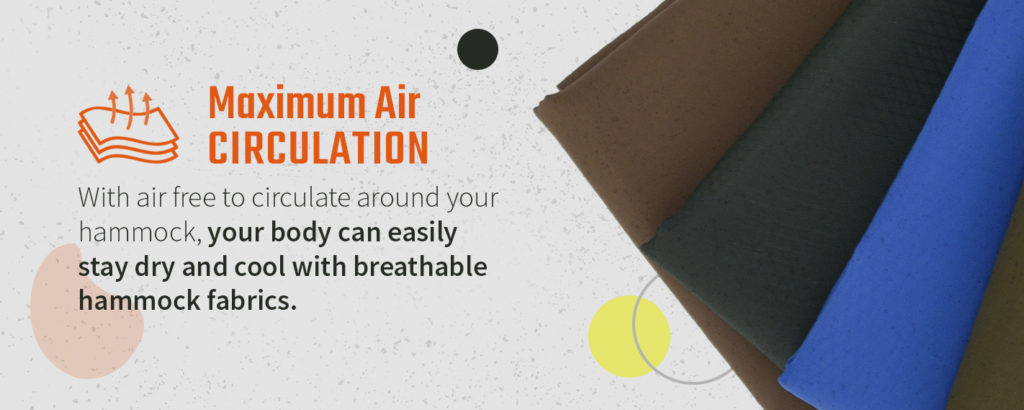
Ventilation is another concern that you won’t have to worry about when sleeping in an open hammock, or a bugnet or netless hammock — versus one with a top cover.
Hammock sleeping keeps your body dry and off the ground — but air circulating under you can make you feel colder quicker, which you might know as Cold Butt Syndrome (CBS). This is where an under quilt can keep your bum toasty.
But for hot summer nights, with air free to circulate around your hammock, your body can easily stay dry and cool with breathable hammock fabrics. These fabrics prevent moisture from building up while you sleep. Sweat and condensation are whisked off your body and the hammock alike, which helps regulate your body temperature and keeps your sleeping quarters dry.
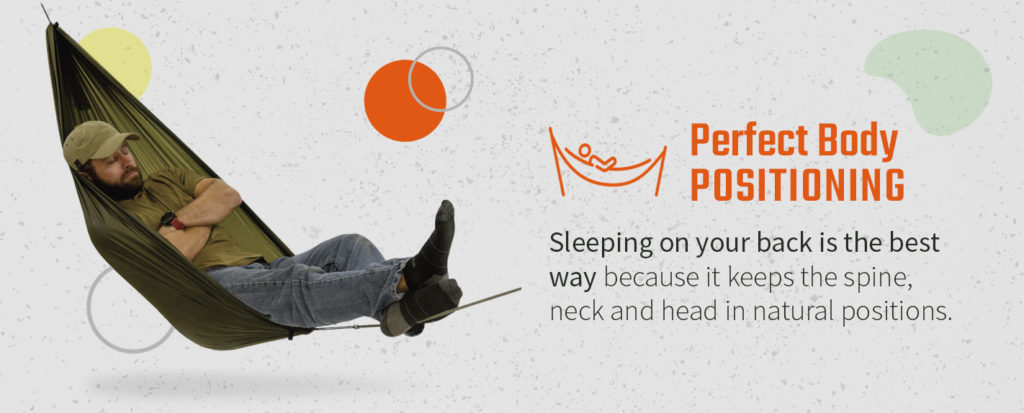
Perfect Body Positioning
Believe it or not, the way you choose to fall asleep at night has an effect on your quality of sleep.
You may sleep in one or more of these positions throughout the night: on your back, on your stomach, on your side or in the fetal position. Although these positions are chosen based on personal preference, each of them impacts everybody’s body in the same ways. Stomach sleeping is considered the least desirable position because it does not keep the spine in a neutral position and places pressure on muscles and joints. The fetal position is also unfavorable because it restricts diaphragm breathing and strains your back and hips.
Side sleeping is a better position for your body because it elongates your spine and keeps your airways open. But sleeping on your back is the best way because it keeps the spine, neck and head in natural positions. This can help relieve back or neck pain and reduce acid reflux. Compare that to stomach sleeping, in which your neck is turned at a 90-degree angle and your stomach contents may get worked up into your esophagus. It’s easy to see why back positions are the best.
The best sleep for your body keeps your spine in a natural alignment throughout the night. If possible, keeping your head elevated is also very beneficial. While you could achieve this with a sleeping bag, you run the risk of reverting back to your normal position overnight. Hammocks allow you to comfortably sleep on your back with your head elevated. Your spine will stay aligned and prevent pressure on your bones.
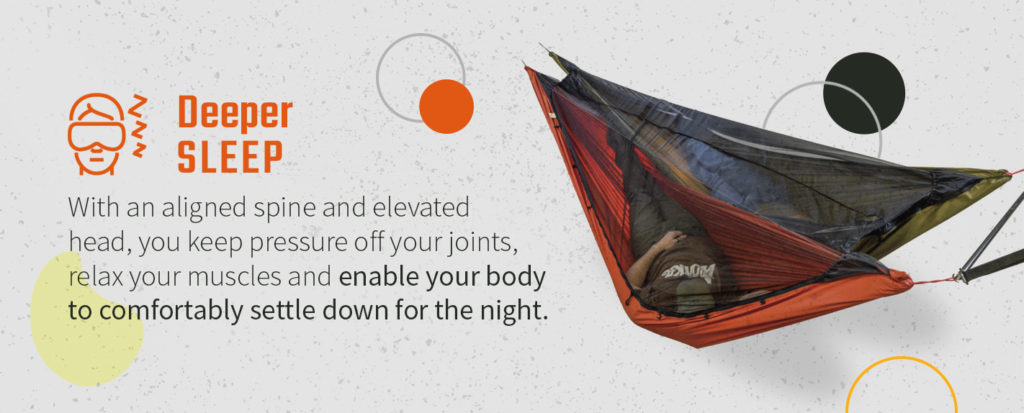
Deeper Sleep
When we think about getting a good night’s rest, many people often associate “quantity” of sleep with “quality” of sleep.
Sleeping in on the weekend or catching up on sleep may seem like a way to feel more rested, but our actual quality of sleep relies on our sleep cycles. There are five different sleep stages that can be separated into two categories: rapid eye movement (REM) and non-REM. As you sleep, your brain moves through all five stages throughout the night.
The initial sleep stage is very light and only lasts for a few minutes. As you transition into the second stage, your brain waves continue to slow down. The third and fourth stages of sleep are considered deep sleep because your eye and muscle activity stops. These stages help the body heal and build up energy. Within 90 minutes, the body enters the REM stage, which can last as long as an hour. You’ll enter this stage multiple times each night as the brain processes and stores information.
Your body needs to naturally progress through these cycles over the course of the night. Unfortunately, many people find that their sleep cycles are interrupted throughout the night. These disturbances cause more than just feeling tired in the morning — they can negatively affect your physical and mental health. A failure to successfully move through the sleep cycles can slow your reflexes, decrease your ability to retain knowledge, cause moodiness, and prevent your body from removing harmful toxins. The constant resetting of the sleep cycle prevents deep sleep.
When you consider the many benefits of sleeping in a hammock, it’s not difficult to see how the hammock’s design naturally helps people achieve and sustain a deeper sleep. Stretching out in a hammock allows you to keep your body in the perfect position for maximum bodily comfort. With an aligned spine and elevated head, you keep pressure off your joints, relax your muscles and enable your body to comfortably settle down for the night.
Studies are also lending support to the idea that the swaying motion of a hammock encourages a faster transition into sleep. Not only is sleep induced in these conditions but it is also sustained. The motion may help increase the duration of the second sleep stage, which is typically the stage of the cycle we spend approximately half of our night in. As research identifies the ways brain waves react to the swaying motion while moving through the sleep cycle, hammock sleeping may help mitigate sleeping disorders.
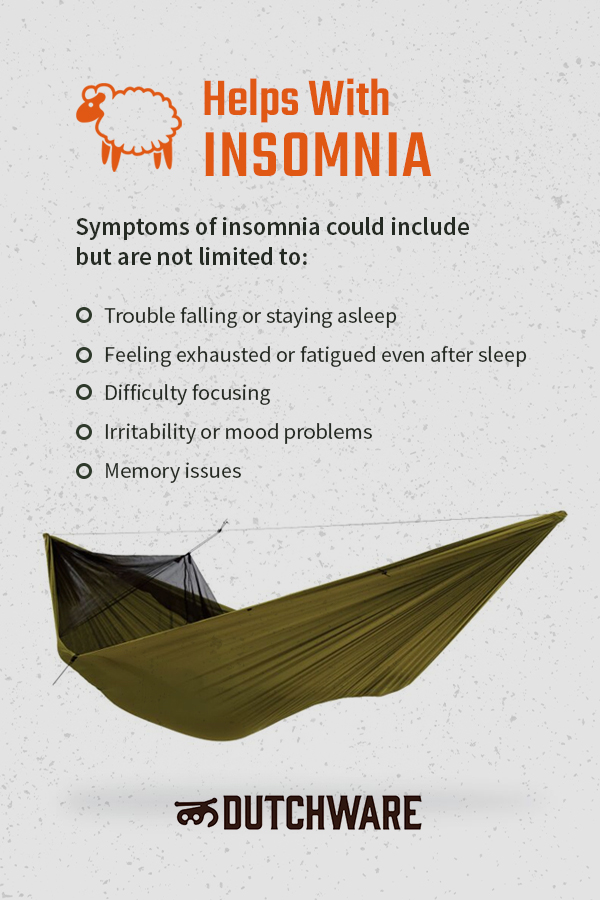
Helps With Insomnia
While some men and women need a comfortable space to feel well-rested through the night, there are many others who suffer from insomnia that prevents them from getting the sleep they need. As many as 40 million people experience insomnia, which is the most common sleep disorder in the country.
Insomnia is more than just occasional sleeplessness — it can last for days or even weeks at a time. Acute and chronic insomnia may be caused by depression, anxiety, food or drink consumption, unhealthy lifestyle habits or other issues.
Sleeping in a hammock can potentially benefit those who suffer from insomnia. Research conducted in a variety of studies suggests that the swaying motion of a hammock can help the body fall into a deep sleep faster. They parallel this idea with the success many parents have while rocking their babies to sleep. Men and women are undergoing tests to see if the swaying motion can lead to longer periods of sleep and potential treatments for those diagnosed with insomnia.
The key element seems to be the changes in brain activity experienced when a person is attempting to fall asleep while being gently rocked by a hammock. Of the five different sleep stages, swaying is thought to increase the length of the second stage, in which we spend nearly half of our sleep cycle. This motion also increases the number of “sleep spindles,” which are associated with the brain trying to keep the sleep cycle calm during the presence of distractions like external noise.
Though further testing is required, many individuals reported positive results after sleeping in a hammock. One study concluded that hammock sleeping may be a potential cure for some cases of insomnia. While every individual’s experience with insomnia differs, evidence points to hammock sleeping improving the quality and length of sleep for all sleepers, including those diagnosed with sleeping disorders.
Elevated From the Wet Ground
If you’re an avid tent camper, you likely understand the struggle of sleeping on cold, wet ground all night. Plus, if you don’t have many options for location, you could find yourself on rough and bumpy terrain. This isn’t the ideal way to snuggle up while camping, especially after a long day of hiking.
Hammocks eliminate these problems, elevating you off the ground for comfortable and high-quality sleep. Since a hammock relieves some of the pressure on your spine, you’ll likely experience a more restful and rejuvenating snooze, preparing you for another day of breathtaking views.
Quicker and Simpler Setup
After a long day, all you want to do is put your feet up and relax. Before you do that, however, you’ll have to set up your hammock. Luckily, one of the significant benefits of sleeping in a hammock is the little time it takes to start hanging!
Most hammocks come with convenient instructions, which usually start with finding the perfect set of trees. Once that’s done, all you have to do is tie your tree-safe straps to the trees, clip in your hammock, and secure any tarps or quilts you want to use. Once it’s secure, you’ll be ready to hop in and sway yourself to sleep in no time.
Remember that you should aim to hang your hammock at a 30-degree angle and no more than 18 inches off the ground for the most comfortable and safe use.
Reap The Benefits Of Sleeping In A Hammock With Hammocks From Dutchware
Your time outdoors should be exciting, amusing and memorable. Unfortunately, a poor night’s sleep can make you feel groggy, irritable and fatigued when you should be having fun. Make sure you have the best sleep possible with a hammock from Dutchware. We offer reliable hammocks made from high-quality materials that provide the comfort you need for a peaceful night sleeping under the stars. These lightweight backpacking hammocks are ideal for short weekend trips to the campground and long treks where campsites may be sparse.
Ready to experience the best sleep you’ve ever had while camping? Contact our team at Dutchware and we’ll help you select the hammock that caters to your outdoor lifestyle.
Check Out These Sleeping Articles
- 12 Tips for Staying Warm While Hammocking
- Sleeping Well While Camping
- Essential Tips for Hammock Camping in The Winter
- Keep Bugs Away While Camping
- 6 Beneficial Hammock Sleeping Tips


